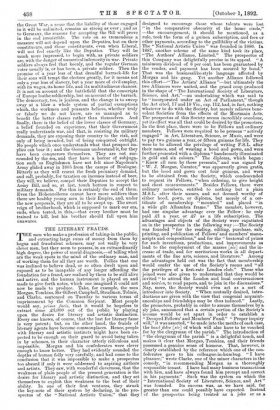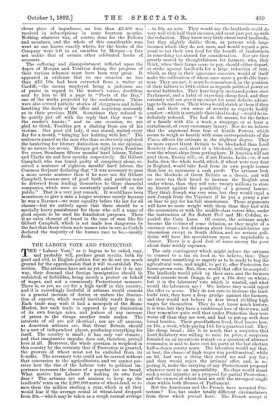THE LITERARY FRAUDS. T HE men who make a profession of
taking-in the public, and extracting large sums of money from them by bogus and fraudulent schemes, may not really be very clever men, but they seem to possess, in an extraordinarily high degree, the power of moral diagnosis,—of telling what are the weak spots in the mind of the ordinary man, and of working them for all they are worth. Follies that one was inclined to believe dead, or so often dwelt upon and exposed as to be incapable of any longer affording the foundation for a fraud, are realised by them to be still alive and active, and the human instrument is played on and made to give forth notes, which one imagined it could not now be made to produce. Take, for example, the men Morgan, Tomkins, Sir Gilbert Campbell, Steadman, Tolmie, and Clarke, sentenced on Tuesday to various terms of imprisonment by the Common Serjeant. Most people would say, prima facie, that it would be hopeless to extract some £3,000 out of the public by playing upon the desire for literary and artistic distinction. Every one knows, of course, that the lust for literary fame is very potent ; but, on the other hand, the frauds of literary agents have become commonplaces. Hence, people with literary and artistic instincts might have been ex- pected to be enough on their guard to avoid being taken in by schemes, in their character utterly ridiculous and impossible. Morgan and his confederates were clever enough to know better. They had evidently sounded the depths of human folly very carefully, and had come to the conclusion that it was impossible to make a prospectus too absurd if only it were addressed to aspiring authors and artists. They saw, with wonderful cleverness, that the weakness of plain people of the present generation is the desire for literary and, artistic distinction, and they set themselves to exploit this weakness to the best of their ability. In one of their first ventures, they struck the key-note of their system by declaring, in the pro- spectus of the " National Artistic Union," that they designed to encourage those whose talents were lost " in the comparative obscurity of the home circle," —the encouragement, it should be mentioned, as a rule, took the form of a guinea subscription, and fees or other payments, according to the gullibility of the victims. The " National Artistic Union " was founded in 1886. In 1887, another scheme of the same kind took its place, "The Authors' Alliance, Limited." The prospectus of this Company was delightfully precise in its appeal. " A minimum dividend of 8 per cent. has been guaranteed by the vendor, and payment has been secured by bond." That was the businesslike-style language affected by Morgan and his gang. Yet another Alliance followed this effort—" The Artists' Alliance "—but ultimately the two Alliances were united, and the grand coup produced in the shape of " The International Society of Literature, Science, and Art,"—an undertaking which was said to be " incorporated under an Act of Parliament," though the Act cited, 17 and 18 Vic., cap. 112, had, in fact, nothing whatever to do with the Society, but merely relieves bene- volent Societies from the effects of the Mortmain Acts. The prospectus of this Society seems incredibly overdone, yet its effect was all that could be desired by the promoters. In the first place, there were to be Fellows and ordinary members. Fellows were required to be persons " actively engaged" in Art, Literature, Science, or Music, and were to pay two guineas a year, or fifteen guineas for life. They were to be allowed the privilege of writing F.S.L. after their names, and of wearing a hood and gown, and were further presented with a diploma " handsomely illuminated in gold and six colours." The diploma, which began : " Know all men by these presents," and was signed by " W. J. Morgan, Curator," was apparently given gratis, but the hood and gown cost four guineas, and were to be obtained from the Society, which condescended to request its Fellows, "when ordering, to give height and chest measurements." Besides Fellows, there were ordinary members, entitled to nothing but a plain M.S.L. after their names, and not deemed worthy of either hood, gown, or diploma, but merely of a cer- tificate of membership " mounted " and placed " in a wide gilt Alhambra frame." The member, however, had one singular advantage over the Fellow : he only paid £1 a year, or £7 as a life subscription. The advantages and objects of the Society were expatiated on in the prospectus in the following way :—The Society was founded " for the reading, editing, purchase, sale, printing, and publication of Fellows' and members' manu- scripts and compositions," and for the " bestowal of prizes for such inventions, productions, and improvements as lead to the employment of the masses [sic] and the in- crease of trade, and for meritorious works in all depart- ments of the fine arts, science, and literature." Among the advantages held out was the fact that membership would confer the use of the Society's rooms and "all the privileges of a first-rate London club." Those who joined were also given to understand that they would be invited " to attend the London and local conversaziones and soirees, to read papers, and to join in the discussions." Nay, more, the Society would even act as a sort of introducer into Society. " When mutually desired, intro- ductions are given with the view that congenial acquaint- anceships and friendships may be thus induced." Lastly, the promoters, probably in order to amuse themselves by a sly joke, announced that a certain portion of the Society's income would be set apart in order to establish a " Decayed Fellows' and Members' Fund." " Proper inquiry will," it was asserted, " be made into the merits of each case, the bond. fides [sic] of which will also have to be vouched for by the clergyman of the parish." The introduction of " the clergyman of the parish " is a delightful touch, and makes it clear that Morgan, Tomkins, and their friends possessed a genuine sense of humour. That, however, is clearly established by the reference which one of the con- federates gave to his colleague-in-humbug. " I have pleasure," wrote Clarke, one of the minor characters in the comedy, " in recommending Morgan as a thoroughly responsible tenant. I have had many business transactions with him, and have always found him prompt and correct in his payments." Such was the system on which the " International Society of Literature, Science, and Art " was founded. Its success was, as we have said, far greater than one could possibly have expected. Instead of the prospectus being treated as a joke or as a clever piece of impudence, no less than £2,400 was received in subscriptions in some fourteen months. Nothing whatever was, of course, done for the Fellows and members, and the whole of this considerable sum went no one knows exactly where, for the books of the Company were left in an omnibus by Morgan—a fate not unlike that of certain other celebrated books of accounts.
The suffering and disappointment inflicted upon the dupes of Morgan and Tomkins during the progress of their various schemes must have been very great. It appeared in evidence that on one occasion no less than £13 10s. had been extracted from a waiter at Cardiff,—the means employed being a judicious use of praise in regard to the waiter's verses, doubtless sent by him to fill a page in " Poets of the Day," one of the works projected by the confederates. There were also several pathetic stories of clergymen and ladies besetting the doors of the office and inquiring anxiously as to their precious MSS. Sometimes they refused to be quietly put off with the reply that they were " in the reader's hands ; " and on one occasion, we are glad to think, Tomkins got a shaking from one of his victims. One poor old lady, it was stated, waited every day for a month, " bringing her knitting with her." The sentences passed on the men who thus so cleverely exploited the hankering for literary distinction were, in our opinion, by no means too severe. Morgan got eight years, Tomkins five years, Steadman fifteen months' hard labour, Tolmie and Clarke six and four months respectively. Sir Gilbert Campbell, who was found guilty of conspiracy alone, re- ceived a sentence of eighteen months' hard labour, the Common Serjeant declaring that "it was necessary to pass a more severe sentence than if he were not Sir Gilbert Campbell, because men of good birth and position must be deterred from lending themselves to these shameful companies, which were so constantly palmed off on the public." That is a very just remark. It would have been monstrous to give a man a longer sentence merely because he was a Baronet—we want equality before the law for all classes—but we entirely agree that there should be a specially heavy punishment for those who sell a name of good repute to be used for fraudulent purposes. There is an extra element of fraud in the case of men like Sir Gilbert Campbell, which is not made less dangerous by the fact that those whom such names take in are, as Carlyle declared the majority of the human race to be,—mostly fools.



































 Previous page
Previous page